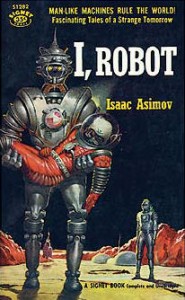 Maria Popova has written an interesting piece on Isaac Asimov’s attitude towards religion.
Maria Popova has written an interesting piece on Isaac Asimov’s attitude towards religion.
Here’s the great man himself:
I have never, not for one moment, been tempted toward religion of any kind. The fact is that I feel no spiritual void.
Well, quite.
That Asimov never “felt” the tug of any faith, let alone any God-shaped hole is, I suspect, a reflection of the fact that an individual’s susceptibility to religious belief or even to “spirituality”(to use that gelatinous term) almost certainly owes more to his or her psyche (we can debate how much of that is down to the genes) than to anything else.
Asimov then succumbs to hubris:
I have my philosophy of life, which does not include any aspect of the supernatural and which I find totally satisfying. I am, in short, a rationalist and believe only that which reason tells me is so.
Oh come on. The idea that anyone’s beliefs are founded solely on reason is a leap too far. Robots may be built that way. Humans are not. Judging by the section I have highlighted in these comments below, Asimov was no exception:
The soft bonds of love are indifferent to life and death. They hold through time so that yesterday’s love is part of today’s and the confidence in tomorrow’s love is also part of today’s. And when one dies, the memory lives in the other, and is warm and breathing. And when both die — I almost believe, rationalist though I am — that somewhere it remains, indestructible and eternal, enriching all of the universe by the mere fact that once it existed.
Eh?
Under the circumstances it’s perhaps not a surprise that Asimov bought into the soft-left mush that is so much of Secular Humanism (there’s a reference to that creed elsewhere in the piece), but I did like this:
There is nothing frightening about an eternal dreamless sleep. Surely it is better than eternal torment in Hell and eternal boredom in Heaven. And what if I’m mistaken? The question was asked of Bertrand Russell, the famous mathematician, philosopher, and outspoken atheist. “What if you died,” he was asked, “and found yourself face to face with God? What then?”
And the doughty old champion said, “I would say, ‘Lord, you should have given us more evidence.’”

Asimov also said, “I am an atheist, out and out. It took me a long time to say it. I’ve been an atheist for years and years, but somehow I felt it was intellectually unrespectable to say one was an atheist, because it assumed knowledge that one didn’t have. Somehow, it was better to say one was a humanist or an agnostic. I finally decided that I’m a creature of emotion as well as of reason. Emotionally, I am an atheist. I don’t have the evidence to prove that God doesn’t exist, but I so strongly suspect he doesn’t that I don’t want to waste my time.”
Free Inquiry (Spring 1982)
Whatever his religious views were, Asimov was suitably obsessed with the Bible at one point to write an extensive and delightfully written commentary on the entire text, including the Apocrypha: Asimov’s Guide to the Bible. Well worth a read.
Whatever his religious views were, Asimov was suitably obsessed with the Bible at one point to write an extensive and delightfully written commentary on the entire text, including the Apocrypha: Asimov’s Guide to the Bible. Well worth a read.
Asimov was Jewish so even if your were not religious the bible would be of interest because of your ancestors and culture beliefs.
Asimov was proud of the fact that he wrote at least one book in every major category of the old Dewey Decimal System.
_Pebble in the Sky_ was one of the first novels I read as a kid, and I’ve been happily reading Asimov ever since. But I soon caught on to the limits of his wisdom, which you have clearly described here. I’ve taken the liberty of reblogging this with links and commentary here:
http://ex-army.blogspot.com/2013/10/asimov-good-stuff-but-you-have-to-know.html
Asimov was indeed a Very Smart Guy, but when I look at his writings on subjects I know something about–military history in particular–I find him often mistaken. File under The Curse of the Polymath.